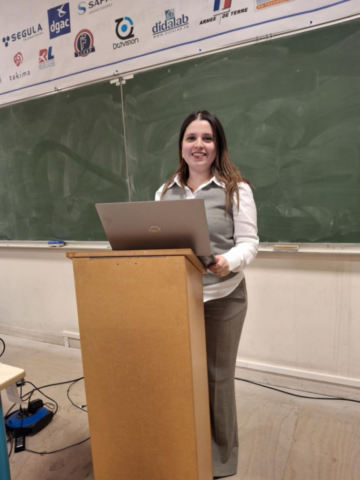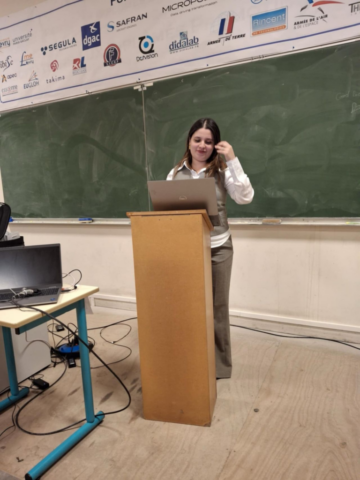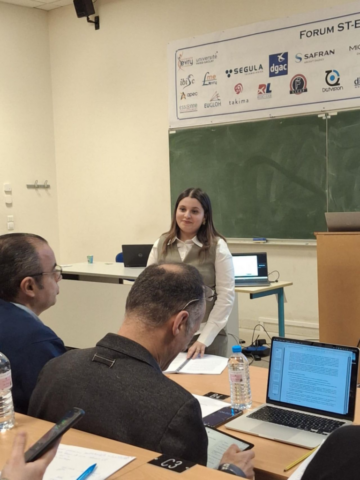Sana BOUASSIDA soutient sa thèse de doctorat le mercredi 18 décembre 2024, 13h30, Université d’Évry site Pelvoux UFR-ST, amphithéâtre Bx30 Yasmina BESTAOUI.
Titre: Optimisation multi-objectif des flux de circulation routière en abord d’intersection
Résumé
Composition du jury de thèse/Doctoral thesis jury composition
| Membre du jury | Titre | Lieu d’exercice | Fonction dans le jury |
|---|---|---|---|
| Feng CHU | Professeure des Universités | Université Évry Paris-Saclay | Examinatrice |
|
Amara LOULIZI |
Professeure | ENIT, Université Tunis El Manar | Invitée |
| Samer MOHAMMED | Professeure des Universités | Université Paris-Est Créteil | Rapporteur |
| Monia NAJJAR | Professeure | Université Tunis El Manar | Examinatrice |
| Jamel NEJI | Professeur | ENIT, Université Tunis El Manar | Directeur de Thèse |
| Najett NEJI | Maître de Conférences | Université Évry Paris-Saclay | Co-encadrante |
| Lydie NOUVELIERE | Maître de Conférences HDR | Université Évry Paris-Saclay | Directrice de thèse |
| Chouki SENTOUH | Maître de Conférences HDR | Université Polytechnique Hauts-de-France | Examinateur |
| Pierre-Olivier VANDANJON | Docteur HDR | Université Gustave Eiffel | Rapporteur |
Sana BOUASSIDA defends her doctoral thesis on Wednesday December 18, 2024, 1:30 pm, University of Évry, site Pelvoux UFR-ST, Amphitheater Bx30 Yasmina BESTAOUI.
Title: Multi-objective optimization of traffic flows
traffic flows
Abstract:
Road congestion in Tunisia, especially in the major cities, is becoming a growing problem, exacerbated in the summer months by the influx of tourists. Around 30% of urban journeys are affected, increasing journey times, energy consumption and safety risks. Faced with these challenges, infrastructure modernization aims to improve the interaction between roads, drivers and vehicles. However, current management methods, such as intelligent traffic lights and speed cameras, have their limitations, particularly in terms of spatial and temporal coverage. What’s more, although driving aids and ITS have reduced accidents, their perception capabilities remain limited in complex environments. This thesis proposes an innovative solution for traffic management using drones. Unlike traditional vehicle sensors, drones offer wide and continuous perception, with the mobility to cover vast areas. Already used in agriculture, the military and logistics, drones are envisaged here to monitor and manage intersections, level crossings and other high-traffic areas.Equipped with advanced intelligence, the drone in question can make autonomous decisions and transmit precise information to vehicles in real time, thereby improving traffic safety and energy efficiency. The first part of the study looks at the impact of drone-based warning systems, particularly in critical situations such as approaching crosswalks or intersections, under a variety of weather conditions and road types. The results show that drones, by providing real-time information, offer more accurate data than traditional systems, facilitating decision-making by drivers and autonomous vehicles. This approach also highlights the importance of optimizing the alerts transmitted by drones to ensure adequate response to specific traffic conditions. The second part of the thesis deals with the formulation of optimization problems based on information perceived by drones. These problems aim to improve traffic fluidity, energy consumption and safety under a multi-objective optimization problem, by integrating drone data into centralized management. comparison was made between the centralized drone approach and the sequential autonomous vehicle approach. The results show that the centralized drone approach is more efficient, particularly in terms of decision acceptance time and traffic improvement. Simulations confirm that drones enable more precise and reactive management of intersection approaches. This study contributes to the design of intelligent intersections by offering recommendations based on the simulations. Drones are particularly effective at managing complex situations, such as tight bends or difficult weather conditions, where traditional systems and autonomous vehicles reach their limits. Thanks to their enhanced perception and ability to make decisions in real time, drones are a key tool for improving road safety and optimizing traffic flow. Integrating drones into traffic management offers major advantages, particularly in complex environments and high-density areas such as Tunisia’s large conurbations. Their continuous and wide-ranging perception, combined with advanced intelligence, improves the safety and energy efficiency of travel. This thesis shows that drones can overcome the limitations of current systems and offer smarter traffic management.
- Date: mercredi 18/12/2024
- Lieu: Université d’Évry, site Pelvoux, UFR-ST, 36 rue du Pelvoux 91080 EVRY-COURCOURONNES
- Doctorante : Sana BOUASSIDA (Université d’Évry, Université Paris Saclay, IBISC équipes SIAM/ENIT, Université Tunis El Manar)
- Direction de thèse en cotutelle: Lydie NOUVELIERE (MCF HDR Univ. Évry, IBISC équipe SIAM), Jamel NEJI (Prof., ENIT, Université Tunis El Manar)
- Co-encadrement de thèse: Najett NEJI (MCF Univ. Évry, IBISC équipe IRA2)







